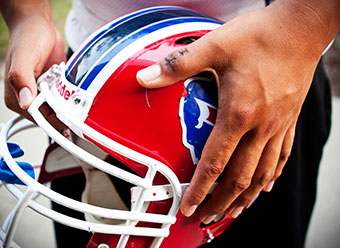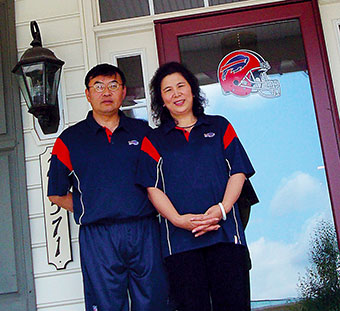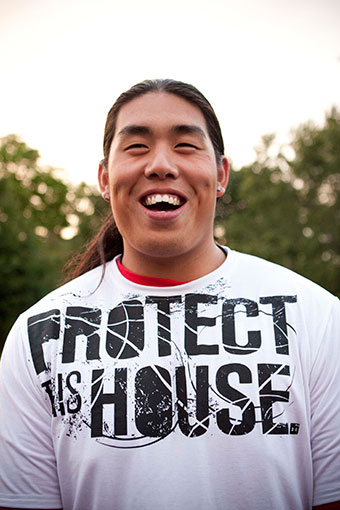Making The Cut
by Charlotte Hsu

Meet Ed Wang, left tackle for the Buffalo Bills and the NFL's first player of full Chinese descent.
The air inside the Buffalo Bills’ autograph tent was hot and sticky, pregnant with the humidity of late July. This was not where rookie left tackle Ed Wang wanted to be. Nevertheless, he hunched his 320-pound frame over a table and went to work, initialing a football, a sports glove, and a few other items.
He gripped a Sharpie in his hand, but his mind was elsewhere. When he lifted his head to survey the remaining fans, he seemed relieved to discover they were waiting for the other linemen attending the pre-season signing session, and not for him.
His handlers, sensing his sour mood, okayed his early departure.
“I had two bad days in a row,” he sighed as he made his way to the locker room. Sweat soaked his hair, which tumbled halfway down his back in tangled, dripping strands. Practice had gone poorly that afternoon. He had struggled, giving up mock sacks.
From there, his luck worsened. The next day, he hurt his thumb. The injury would require surgery. As he readied for the operation, he wondered how long it would take to recover. Two weeks? A month? Training camp had started less than a week before, and he could not afford to sit out. He had already lost valuable practice time in June to a high-ankle sprain. What else could go wrong?

Wang, a fifth-round draft pick out of Virginia Tech, is the NFL’s first player of full Chinese descent, though he has nowhere near the star power of Asian sports heroes like Houston Rockets center Yao Ming or Seattle Mariners outfielder Ichiro Suzuki. The Bills brought Wang on to add depth to their roster, and even if he survives pre-season cuts, he’ll likely see few minutes on the field this year.
But Wang never expected to be famous. He just wants to play.
Friends say Wang is the kind of athlete who, even in college, refused alcohol during the season. At parties, he volunteered as designated driver. His parents, track-and-field professionals who once held spots on China’s national team, started coaching him at age six for a future in the NFL. He grew up on whole milk and steak—fat slabs of beef for dinner three times a week.
His life has been one of expectations, and now he is looking to prove himself one more time. He can’t let the opportunity slip away—not after all he has weathered, after all his parents have given to catalyze his dreams.
NANCY WANG, Ed’s mother, left home at 14, trading the wind-polished beaches of her native Dalian for the alien skyline of Beijing. She was chasing greatness. If, as a mother in later years, she pushed Ed to the precipice of breaking, it was because her own history taught her what it takes to reach the ranks of the elite.
As was typical of China’s best athletes, Nancy spent her teenage years training with a government team in the nation’s capital. She remembers practices taking place three times daily, spanning the hours between the early morning and late afternoon. A half day off on Sunday provided the only break. Recruits could only visit their families once a year.
In this new life, a new friend encouraged Nancy’s success and shielded her from loneliness. Tall and skinny, Robert Wang was a high-jumper, the son of a doctor and a bridge engineer.
Together, Robert and Nancy traded jokes and swapped stories. Robert told Nancy about growing up in land-locked Lanzhou, an urban center on the Yellow River 1,000 miles southwest of Beijing. Nancy told him about Dalian, a seaside city 500 miles in the other direction.
To Robert and Nancy’s surprise, their coaches granted them permission to date. On the track and field, each pushed the other to excel. Both flourished, and in 1980, they prepared for the Olympics. Nancy was one of the best hurdlers in the country. Robert was a back-up.
But China boycotted the games in Moscow that year, protesting the Soviet invasion of Afghanistan. Following that disappointment, Robert ended his athletic career. He made arrangements to emigrate to the United States. His family, including his parents, had moved to Northern Virginia not long before, and his father had urged him to join them there.
At the time, China was emerging from one of the most turbulent periods in its modern history. The future looked promising but uncertain. Society was still recovering from the Cultural Revolution of the late 1960s and early 1970s, during which the ruling Communist Party sanctioned the violent persecution of intellectuals and other alleged enemies of the state.
The day before Robert left for America, he and Nancy obtained a marriage certificate from local authorities.
“Their office closed at six, and we were there at 5:45,” Nancy remembers. “He had to fly [the] next morning at eight.”
For the first time in about a decade, the two parted ways. Before joining her husband abroad, Nancy would stay in China for a few more years to train, hoping for a shot at the 1984 Olympics. Once again, she would make the team. But once again, misfortune would rob her of the opportunity to compete.
SO THIS IS where a career in the NFL begins. In June, not long after hurting his ankle, Ed relaxed in his apartment in Orchard Park, playing Call of Duty on an XBox with one controller. Through an earpiece, he could hear a chorus of voices—friends who had plugged into the game from remote locations.
The temporary residence he shared with a fellow rookie was functional, sparse: two bedrooms, a bathroom, a kitchen, a living room, and a small dining nook. Artificial plants that came with the unit added a splash of green, contrasting with an otherwise neutral interior.
Away from home, Ed had surrounded himself with the things that gave him comfort. Bags of gummy candy and Lindt truffles occupied the top of his dresser, along with two tins of Khong Guan cookie rolls, and snapshots of his parents and Christina Norby, his girlfriend, a junior at Virginia Tech.
Despite receiving a signing bonus of about $200,000, Ed is living, essentially, as he did in college. As his best friend and manager, Kyle Gochenour, says, “He still wears the free clothes that Virginia Tech gave him every season.”

The most striking thing about Ed’s life is, perhaps, how normal it is. He is shy. He likes burritos and chicken wings. Scary movies terrify him. After watching Saw, he says, “I couldn’t sleep for, like, two weeks.” To commemorate a visit to Ralph Wilson Stadium in late spring, he posted a video on his Facebook page showing him doing a round-off at mid-field.
In many ways, he’s just a regular 23-year-old with regular 23-year-old problems. One afternoon in June, he went with Norby to a local Best Buy, hoping to apply there for his first credit card. He found the paperwork befuddling and exited the store minutes later, empty-handed. Better to wait than sign an agreement he might regret, he thought.
Because of Ed’s background, his entrance into the NFL gained a measure of attention. ESPN and Sports Illustrated profiled him. On a trip to China, Secretary of State Hillary Clinton gave him a shout out in a speech that applauded the accomplishments of Chinese Americans, including cellist Yo-Yo Ma and architect I.M. Pei.
At the root of Ed’s connection with China is his relationship with his parents. The discipline they learned while training in Beijing has defined not only their lives, but his.
“I feel very grateful for my parents, because without them, I honestly don’t think I would have made it here,” Ed says. “I owe everything to them…I was fat and unathletic and lazy when I was a child.”
Nancy and Robert wouldn’t put it quite that way. (“He’s a very good boy,” Nancy says. “He listen, whatever we tell him.”) But the parents do recall how a chubby, six-year-old Ed struggled to meet the demands of an exacting workout.
After practice in a youth football league, Nancy would ask Ed to run extra laps. When he got to the far side of the track, she remembers, he would lapse into a walk, swinging his arms in rapid motion with the hopes of creating the illusion of jogging.
Nancy’s eyes light up with laughter as she tells the story, recalling the way her son would speed up and start exhaling loudly as he approached her at the starting line. His tricks never worked, and when she caught him cheating, she would order him to do more laps.
Always obedient, Ed would comply, bursting into tears, but still running.
That rigor was indicative of many aspects of the young Ed’s life. When he missed a spelling word on a practice exam in second grade, Nancy made him write the correct version 20 times. The penalty for the next mistake was 100 repeats. If his handwriting was sloppy, she would tear up the binder paper and tell him to begin again. Later, Robert applied the same philosophy to sprints; each time Ed fell short of a training goal, his father would add more drills to the agenda.
“My parents told me it’s not okay to lose,” Ed says. “They said it’s not okay to lose. It’s not okay to get beat. That’s what they told me. They instilled that in me when I was a child—try to be better than everybody.”
At the same time, they taught him humility. Never celebrate too soon, they said. At home in Ashburn, Virginia, this July, Nancy jotted down a Chinese saying that reflects the attitude she and Robert tried to instill in both Ed and his little brother David, an offensive lineman at Virginia Tech who aspires to follow Ed into the NFL:
Shan wai you shan. Ren wai you ren.
Beyond every mountain is another mountain. Beyond every man is another man.
Before the NFL draft this April, many scouting reports had predicted Ed would go in the second or third round. Loved ones gathered at Ed’s apartment in Blacksburg, Virginia, to watch the proceedings over plates piled high with giant strawberries, nuts, and other snacks. As the fourth round came and went, Robert grew nervous. Gochenour, who was holding Ed’s cell phone, stared at the device for hours, praying it would ring.
The call from the Bills finally came in the fifth round. Ed, who had been outside, tossing a football, rushed back into the living room. He gave his mother a hug.
“Mom, I got a job,” she remembers him telling her.
“Make sure you’re working hard,” she responded.
It was an incredible moment. Robert says it didn’t matter that Ed was a relatively late pick. Shan wai you shan. Ren wai you ren.
Left tackle is a premier position—one of the highest-paying in the NFL. Duties include protecting right-handed quarterbacks’ blind side. Ed had only transitioned into the job in college, and for him, making it to the NFL was the achievement.
The dream had come true.
IF ED’S NFL CAREER does not take off the way he hopes it will, his mother will be among the many athletes who will understand his pain. In 1984, Nancy says, she suffered an injury the week before her team was scheduled to leave for the Olympics in Los Angeles. The heartbreak was sudden, intense.
Later that year, she put her dreams behind her and boarded a plane for the United States. She arrived with $50 and took a job as a hostess, working at a Chinese restaurant six days a week. She remembers some shifts lasting 14 hours.
“I should not be here,” she often thought.
But ultimately the discipline she had learned through sports carried her through that difficult time. She and Robert landed jobs in food and beverage at the Marriott, where they impressed their bosses and rose to become managers, positions they still hold. They saved their money and began to think about the future they wanted for Ed and David.

Coming from China, neither Nancy nor Robert knew much about American football. But when neighbors and coaches recommended that Ed play, the parents set out to learn more. They watched professional games. Robert borrowed books on the sport and peppered Ed’s coaches with questions.
When Ed grew older, Nancy and Robert bought a house with a back porch overlooking the field at Stone Bridge High School in Ashburn, Virginia. If Ed could make it to the NFL, they thought, he would have a good life.
Nobody laughed. Classmates saw Ed working out on the track several times each week outside of practice. They knew he lifted weights at home with his dad and brother. Ed committed to Virginia Tech in his junior year of high school. As a Stone Bridge senior, he started on both offense and defense, playing tight end and defensive end.
The family’s work ethic inspired teammates, some of whom asked to join the Wangs’ private speed training sessions. Saliq Khawar, a fellow football player, says under the Wangs’ tutelage, the amount he could bench rose from 185 pounds to 295.
At the Wang residence, cookouts and sleepovers provided an antidote to grueling workouts. Nancy and Robert opened their home to Ed’s friends, who gladly accepted regular invitations to hang out or stay over for dumplings, noodles, hot dogs, or steak.
“His dad has the best grilled food you’ll ever have,” says Khawar, Ed’s backup as defensive end and a close friend. “I’m a person who hates seafood, and I love his shrimp.”
“That whole family is well thought of in this community. Everybody knows who they are,” Stone Bridge football coach Mickey Thompson says. Even now, when Ed returns to Ashburn, he trains on the high school track.
WANG KAI. Ed’s Chinese name translates, roughly, to “triumphant” or “victorious.” He has never been on a losing team. The Bills last made the playoffs a decade ago. Asked whether that record worries him, Ed responds diplomatically: He is looking forward, he says, to doing whatever he can to helping the franchise turn things around.
With injuries sidelining him, Ed is still waiting, in many ways, for his professional career to begin. But he has some smiles left in him. He has made it this far. He remembers how when he was younger, other kids used to tease him, calling him a Communist or pulling their eyes into a slanted squint. And he remembers how, as the years progressed, his success squelched the taunting.
Robert and Nancy might not lavish their son with praise. But he knows they are proud. They have booked plane tickets to Buffalo for every one of the Bills’ home games. They have plastered giant Bills stickers on their cars and front door. They have purchased T-shirts, hats, logo gloves for the winter, a team football, and an Ed Wang jersey.
He is their son, No. 71.
In the Wang’s basement, portraits and game-day shots of Ed and David clutter the walls, a mosaic of memories. The photographs are a timeline, beginning with the boys’ youth league years and moving through their seasons at Virginia Tech.
But, of course, the brothers’ journey does not end there. No one can predict how Ed will perform for the Bills. At Virginia Tech, he anchored the offensive line. For a left tackle, he is quick and nimble.
Still, he feels anxious. Between August and early September, the team whittles its roster from 80-some men down to 53. Ed continues to sit out from training due to his thumb injury, and according to the team’s public practice notes, Head Coach Chan Gailey called that kind of missed time a huge setback for a rookie.
“The only guy that can kind of weather that storm is a vet, a guy that’s been around five or six years and has his position firmly entrenched,” Gailey said.
If Ed’s pro football career ends quickly, he plans to get to work on another dream: opening a training facility for elite high school athletes. He hopes he won’t have to pursue that alternative any time soon.
But whatever happens, he will take pride in knowing he has already left his mark in one important way.
The children of Western New York might not have been interested in Ed’s autograph during training camp this July. But earlier in the year, he had felt honored to receive letters from well-wishers an ocean away. After reading about Ed in their national press, students in China penned him personal messages. They told him they were excited to learn more about American football.
They were proud, they said, to see a Chinese player in the NFL.
Charlotte Hsu is a freelance contributor to Artvoice. A former reporter for the Las Vegas Sun, she now works in the University at Buffalo’s communications office. She writes about Buffalo at cjhsu.wordpress.com.
Christina Shaw is a freelance photographer based in Buffalo. You can see her work at christinashaw.tumblr.com.
|
Issue Navigation> Issue Index > v9n34 (week of Thursday, August 26) > Making The Cut This Week's Issue • Artvoice Daily • Artvoice TV • Events Calendar • Classifieds |









 Current Issue
Current Issue